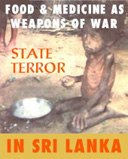"To us all towns are one, all men our kin. |
"To us all towns are one, all men our kin. |
| Home | Trans State Nation | Tamil Eelam | Beyond Tamil Nation | Comments |
Sri Lanka's Genocidal War - '95 to '01

Medical officers in Mallavi hospital in Mullaitivu District say 95% of the medicine stock is exhausted. Vitamins, antibiotics, drugs for diabetes and heart disease, anti-rabies vaccine and dressing are not available. In mid-November, the Army introduced new restrictions on people travelling into the Vanni from Vavuniya. Henceforth, each person will be allowed to carry only two small parcels of food or any other material.
Torrential rains caused havoc in Amparai and Batticaloa districts in mid-November. Over 100,000 families were affected by the floods. Batticaloa Government Agent R Monagurusamy says 40,000 acres of rice lands are inundated causing estimated losses of Rs 100 million. Damage to roads, tanks, houses and other buildings is estimated at Rs 700 million ($8.6 million) .
In Amparai District, over 2,500 refugees were not provided dry rations for the last three months. After a local MP intervened, dry rations for two months were issued in mid-November. The refugees were displaced in 1990 and have demanded repeatedly to be allowed to return to their villages.
In Trincomalee District, the ban on fishing following the sea-borne attacks of the LTTE in October, has affected 8,000 fisher families in coastal areas. The security forces also denied permission to the fishermen to hold a protest meeting against the ban.
Reports say that Mannar Bishop Rayappu Joseph has arranged lands for the resettlement of 1,280 people in Pesalai refugee camp on Mannar Island. These refugees are from Vidataltivu on Mannar mainland and were displaced in June 1999 following Army’s Operation Rana Gosha IV (Battle Cry).
The Bishop visited the camp on 5 November. Fishermen among the refugees told him that they were being harassed by the Navy and requested the Bishop’s intervention to secure monthly permits for fishing in place of the current weekly permits. On 13 November, 31 refugees arrived by boats on Mannar Island from Mulangavil on mainland Vanni. They say that they left the area because of shortage of food and medicines. Twenty five refugees left for India in boats from Pesalai on 23 November...
The Army shelled Soodaikudah, five miles north-west of Muthur, on 13 November, killing B Kugarajah and damaging his house extensively. Over 450 families fled further south and took refuge in schools. The UNHCR and ICRC are assisting the refugees.
Reports say Rakkuli and Navalady villages, two miles west of Muthur, are being shelled for the last three weeks causing damage. The local people have written to President Chandrika requesting her intervention to stop the Army targeting populated areas..." (British Refugee Council, Sri Lanka Monitor November 2000)